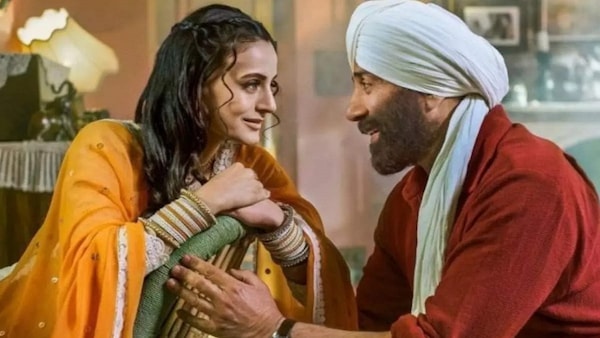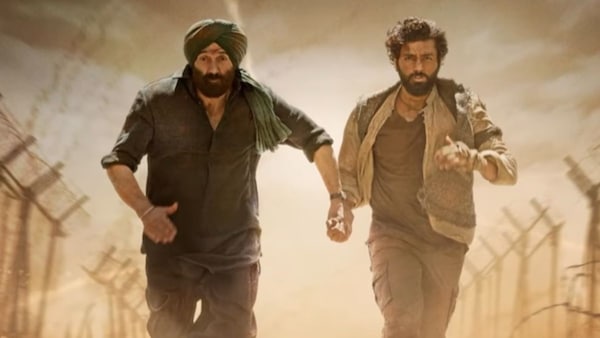Gadar 2 Is Dated, Loud — & Wholly Unnecessary
This is #CriticalMargin, where Ishita Sengupta gets contemplative over new Hindi films and shows. Here: Gadar 2.

Last Updated: 03.37 PM, Aug 11, 2023
IT is oddly moving to see a sequel to Gadar: Ek Prem Katha, Anil Sharma’s monstrous hit from 2001, in 2023. There is a gap of two decades in between. But time is not the only thing that has changed. The language of patriotic films in India has altered, the tone has become combative, themes lean more on jingoism and the very air in them has become more aggressive. In such a case, Sharma’s decision to revisit a film, which centred on the love story of a Sikh man and a Muslim woman during the turbulence of Partition in 1947, appears to stem from commercial and sentimental reasons. The Sunny Deol starrer was also a propaganda film of its time but there was an attempt for inclusivity and acknowledgement of multiple faiths through the lifting of hand pumps and raging roars. Part two of this film is a mess of conflicting proportions. The disparity of ideology at every given moment is so much that I was reminded of the many liberal uncles at parties who reveal their news source to be WhatsApp after they are drunk enough.
The year is 1971. East and West Pakistan are caught in turmoil. In India, Tara Singh (Sunny Deol) lives happily with his ‘Madamji’ Sakina (Ameesha Patel). He still drives trucks, and their son Charanjeet Singh (also known as Jeete; Utkarsh Sharma, who featured in the original) wants to be an actor. The film “portrays” this desire by adorning his room with unimaginative posters of Dev Anand and Rajesh Khanna. When Tara Singh goes missing while helping the Indian Army, his son goes to Pakistan in search of him. Couple of days (months? years?) later Tara turns up and, finding his son missing, undertakes his customary ritual: visiting Pakistan as an excuse to lift a hand pump.
Notwithstanding the premise which is essentially a repetition (the son, not unlike the father, falls in love with a girl in Pakistan), the filmmaking of Gadar 2 is distractingly cumbersome. There is a sense of datedness and no sense of continuity. When Jeete goes to a jail in Pakistan to find his father, he conveniently changes his attire to a uniform. Three words: How, What, When? When Tara Singh arrives in the country for Jeete, the father and son keep missing and finding each other like Pakistan is the name of a street. Three words again.
In one instance an army officer starts speaking to someone else while talking to a distressed Sakina. The moment and the camera move on like the scene was written as an ‘either or’ scenario and the filmmaker decided to put both. When a hapless senior Indian officer asks for help from a turbulent zone, he is told, “Major, control yourself.” To be fair, the dialogues are a constant problem and by the later half, Tara Singh and his adversary, Pakistan Major General Hamid Iqbal (Manish Wadhwa), a religious fanatic, indulge only in grunting like prolonged foreplay.
The performances, obviously, are an issue. Patel appears on screen after a long time and spends most of her time hyperventilating, reminding us of her Aap Mujhe Achche Lagne Lage days. She also looks rather confused that her husband and son are in Pakistan again, and frankly even bored. There are several scenes of her praying which she does by folding hands, raising them (like one does in Islam). In one scene her hands just float in the air, oblivious to what needs to be done. It is nice to see Deol but his performance operates on two extremes: he is either happy or raging.
The politics too is out all over the place. With his new outing, Sharma seeks to appease the loyal fan base and garner a new one. Thus there are talks about secularism which are quickly followed by jingoistic phrases. The unhinged General Hamid Iqbal is supposed to be an odd one out, a cruel man who commits crimes in the name of religion. Someone who hates Hindus (he is introduced in a scene where he asks an obviously Hindu man, with tika et al on his forehead, to choose between the Gita and Quran). If he is not supposed to represent the common worldview of the neighbouring country (Sharma scatters the second half with several ‘good’ Pakistanis), it is not never explicitly mentioned.

It also ought to be told just how ridiculous and frankly unnecessary the second half is. The action set pieces unfold like the only brief was ‘be as crude as possible’. Necks are severed, electric poles are uprooted as two Indian men bring an entire army force of Pakistan to their knees. Gadar 2 doesn't just sideline reality, it does not even try. Every emotion is dialled up as the character of Tara Singh reveals himself to be a confounding caricature. In one moment he espouses values of love and in the other he seethes with rubbish like, if given a chance half of Pakistan will leave and stay in India.
I bet he is the person who votes for NOTA during elections.
By the time the film concludes, it becomes amply clear that Sharma’s objective of making Gadar 2 is to encash on the current volatile climate of the country. It is to claim his share in a pie he was one of the firsts to make. There is a moment in the film when Tara Singh refers to Partition as a tragedy which people have supposedly moved on from. The year is 1971, a little more than a decade since a million people lost their lives. That scene says everything about the film’s research, intent and purpose.
(Disclaimer: The views expressed in this column are those of the author and do not necessarily reflect the official policy or position of OTTplay. The author is solely responsible for any claims arising out of the content of this column.)

